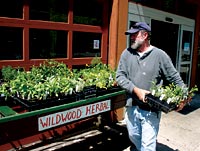“Betty started this business in 1982 and it’s gone through a lot of transitions.” The speaker is Alan Salmon. Betty Sparrow is his wife and co-grower at Wildwood Herbal Flower Farm, a small-scale nursery a stone’s throw from the Zebulon Vance birthplace on Reems Creek Road in Weaverville.

Sparrow started her plant venture in Albemarle, northeast of Charlotte, and the couple married and became business partners in 1984. They worked at it full-time and conducted a strictly wholesale business. “Nobody was doing 3 1/2 inch herbs,” recalls Salmon. “There were some herbs in cell-paks, but herbs were just starting. And the only people doing a variety of herbs were the folks at Sandy Mush Herb Nursery. So we decided to go for it, and it went well. For eight years in Albemarle, there was very little competition and we delivered to Raleigh, to Greensboro and to Charlotte.”
The mountains were calling, however, particularly for Sparrow, who is a graduate of Appalachian State. When Salmon’s father died and left him some money, the couple decided to relocate. Finding a likely homestead and refurbishing one of the partly decrepit buildings took four years and they moved into the restored home in 1990. After moving themselves and their growing business they faced a problem however. “Our biggest customer was in Raleigh. We began to see that we couldn’t stay competitive in the Raleigh market with the long-distance delivery. And while we had great employees, even though we were getting bigger we were making less money.”
Although they’d never used chemical pesticides (since there are no pesticides approved for herb production), they’d used chemical fertilizers. But they saw the growing market for organics and switched over one greenhouse to all organic fertilizer. At the same time, one of their employees had worked at Earth Fare grocery and made a connection there. They started offering organic herbs at the grocery.
Meanwhile, they discovered that the organic greenhouse was experiencing fewer pest problems. “There was slower growth, but [the plants] were healthier,” recalls Salmon, “So we began a transition.” They pulled out of the Piedmont market, where they had been wholesaling conventionally grown plants and slowly pared down to an all-organic growing operation run by just family members—the couple and their two sons. Today they provide plants to all of the Earth Fare stores via the grocer’s Fletcher warehouse, and stock plants at Greenlife Grocery and the French Broad Food Co-op. “We’re better off financially than we ever were before,” Salmon reports.
Whereas they once dealt in thousands of single-variety flats for which their responsibility ended upon delivery, today they not only sell to retailers but maintain the plants and displays at each location. “We restock, water and clean the plants, to keep it all looking good. And instead of dealing in whole flats of each variety, we provide a mix, so shoppers have a wider choice and the store doesn’t end up with a lot of something that doesn’t sell.” In addition they run a retail business at the nursery where they sell plants at a substantial discount. “If someone takes the trouble to drive way out here, we want to make it worth the trip,” he says.
As well as the nursery business, the couple rents out one of the two homes on the property to vacationers or people coming into the area to house-hunt. Much like Judi Hansen and Tom Hare at Briar Rose Farm, (See “Farm and Garden” April 4, Xpress) Salmon and Sparrow have found that diversity of income sources as well as plants is a key to success.
Along the way they’ve experimented and learned what works for organic greenhouse production. They stopped heating year-round, relying only on solar gain in December and January, even leaving the doors open “when it’s not too cold.” This interrupts the insect pest cycle. They also encourage beneficial insects and predators, permitting weeds to grow on the greenhouse floor and encouraging spiders. For fertilizer they rely on fish emulsion and Plant-Tone Espoma(r), a blend of manure, slaughterhouse and plant waste.
“We try to grow staples, the things we know will sell, but we also mix in some perennials,” Salmon notes, pointing out some golden feverfew and golden thyme plants amid mixed trays of annual herbs and tomato seedlings. “Particularly plants like these, that make the tables look pretty.”
For more information or directions to the nursery phone 645-4342 or simply follow the signs toward the Vance birthplace from Weaverville.


Before you comment
The comments section is here to provide a platform for civil dialogue on the issues we face together as a local community. Xpress is committed to offering this platform for all voices, but when the tone of the discussion gets nasty or strays off topic, we believe many people choose not to participate. Xpress editors are determined to moderate comments to ensure a constructive interchange is maintained. All comments judged not to be in keeping with the spirit of civil discourse will be removed and repeat violators will be banned. See here for our terms of service. Thank you for being part of this effort to promote respectful discussion.